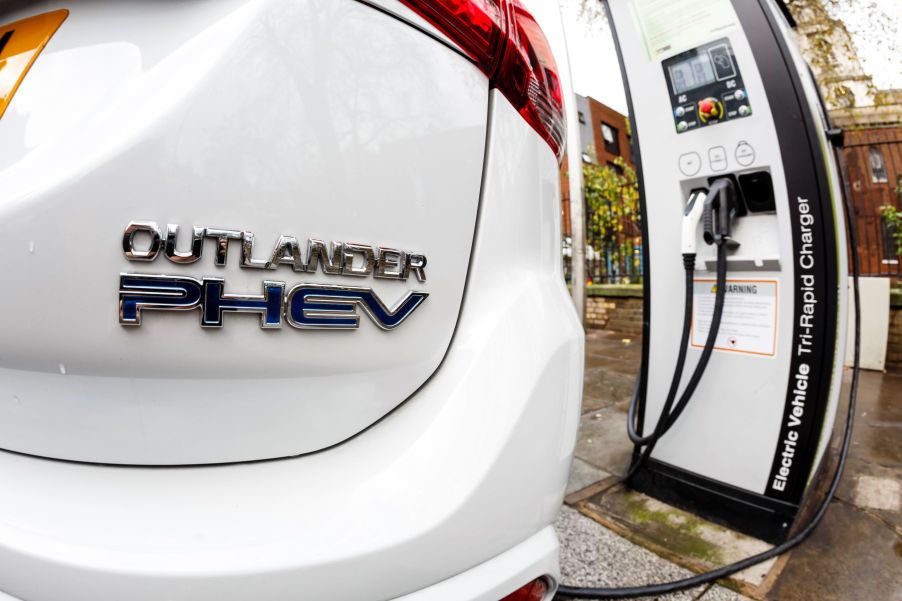
How Much Does It Cost to Charge a Plug-in Hybrid Electric Vehicle (PHEV) With Level 1 Charging?
Electric vehicles (EVs) and plug-in hybrid electric vehicles (PHEV) are available from a growing number of automakers. Both types of vehicles provide a wide range of driving range options on an electric charge. Owners of PHEVs have the option of not plugging their vehicle in at all, relying completely on the car’s internal combustion engine. There are several models of PHEVs available, as well as changing technology to keep the hybrid battery powering the vehicle. So, here’s a look at how much it costs to charge a PHEV using Level 1 electric vehicle charging.
Charging a plug-in hybrid can be easily done at home
Owners of plug-in hybrid electric vehicles (PHEVs) can charge their cars in multiple settings. The Alternative Fuels Data Center explains that the hybrid battery on a PHEV is charged continuously while driving. It receives a charge from the rotation of the tires as well as when the vehicle is braking. This is not enough activity to fully charge a hybrid battery, but it does provide a small, basic, and helpful charge.
Plugging in a PHEV charges the hybrid battery to provide anywhere from 12 to 40 miles of driving range without using any gasoline. There are three different levels of charging for an electric vehicle. Neocharge breaks them down by level, time to charge, and where to find a place to plug in.
Level 1 charging is that it only requires a 120V standard outlet. This is the basic electrical outlet used in residential homes. According to Consumer Reports, owners of a PHEV only need to plug into an available outlet to charge their vehicle.
Level 2 charging provides 240V of electricity, making vehicle charging faster than Level 1.
Level 3 charges at 480V. This supercharging level is only used for fully electric vehicles. There is a unique plug that charges beyond what any PHEV can use.
The time needed to charge an electric vehicle is a concern for consumers, in addition to the cost to charge their car. The time required to charge varies by the level of the charging equipment as described by the Department of Transportation. Using Level 1 charging, PHEVs can be charged in a relatively short period of time at a rate of 3 to 5 miles per hour of charging.
What it costs to charge a PHEV with a Level 1 charger
Determining the cost of charging a PHEV at home using a Level 1 charger is by first identifying the cost of electricity at the charging location. This is the cost per kilowatt hour (kWh).
The cost of electricity varies significantly across the United States. A breakdown of the average cost of charging an EV or PHEV is provided by Kelly Blue Book.
Dividing the kWh cost by kWh needed to fully charge the vehicle provides the price. At a cost of $0.20 per kWh and 4 kWh to charge for 20 miles, that is $0.80 or $4.00 for 100 miles. If a vehicle gets 50 mpg and gas is $3.00 per gallon, plugging in at home is still cheaper than gasoline.
The value of charging a PHEV using home Level 1 charging
Even with rising energy costs, Level 1 charging is a bargain. Owners with short commutes can drive to work without any gasoline usage. Coupled with the availability of free charging stations, PHEV owners save money even with variable gasoline prices.
With the rising availability of Level 2 charging stations worldwide, PHEV owners are increasingly able to charge their vehicles quickly and drive at nearly no cost.
Options PHEV owners have to use Level 1 charging outside the home

Owners of PHEVs can find access to Level 1 or Level 2 charging stations when away from home. The network of EV chargers is growing, according to data from the Department of Energy (DOE).
Many workplaces offer free or cheap Level 1 or 2 chargers for employees and customers. Some employers may allow employees to plug into an outside socket as well. Commercial areas such as shopping centers and restaurants are also adding charging stations for visitors.



